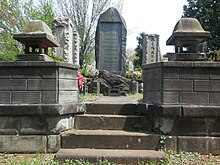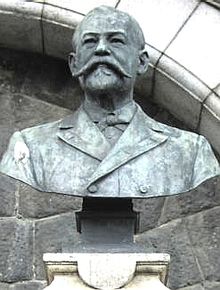Julius Scriba

Julius Karl Scriba (born June 5, 1848 in Reinheim , Germany , † January 3, 1905 in Tokyo , Japan ) was a German surgeon . He worked from 1881 as a professor at the University of Tokyo and as a medical advisor to the Japanese government during the Meiji period . Together with the internist Erwin Bälz , he is considered to be a co-founder of modern medicine in Japan, where his work contributed in particular to the development of surgery and nursing .
Life
Julius Scriba was born in Reinheim near Darmstadt in 1848 and initially wanted to become a pharmacist like his father , but then studied medicine . He interrupted his studies to take part in the Franco-German War of 1870/1871 as a one-year volunteer and assistant doctor , and received his doctorate three years after the end of the war at the University of Heidelberg with a thesis on abdominal cancers. He then worked, temporarily under Vincenz Czerny , as an assistant doctor and after his habilitation in 1879 on fat embolism as a lecturer in surgery at the University of Freiburg . He made important contributions in particular in the areas of kidney and stomach surgery. He was also interested in botany and published works on the flora of the Grand Duchy of Hesse .
In 1881 he was brought to Japan as the successor to Emil August Wilhelm Schultze as a foreign expert ( o-yatoi gaikokujin ). There he worked from June 6, 1881 as a professor of surgery at the University of Tokyo and head of the surgical department of the university hospital. Together with the internist Erwin Bälz , he was one of the first medical professors at the university that had been founded four years earlier. In addition to surgery, he also taught dermatology , ophthalmology and gynecology . Many of his students were later appointed to senior positions in hospitals and universities in Japan. In 1885 he was the first to describe the endemic form of the bacterial infectious disease pyomyositis in the tropics.
After his contract had expired on June 5, 1887, he initially returned to Germany, but then worked again from September 2, 1889 to September 10, 1901 at the University of Tokyo. During the great earthquake of 1891, Julius Scriba set up several emergency hospitals and catering facilities for the earthquake victims in Tokyo and Kyoto . Between 1901 and 1905 he was chief surgeon at St. Lucas Hospital, an American mission hospital in Tokyo. During his total 25 years of ministry in Japan, he also led Nursing Teaching German model and founded in Tokyo a sister school .
In addition to his academic work, the Japanese government used his help in two diplomatic incidents. When the future Russian Tsar Nicholas II was attacked and injured with a sword by a Japanese policeman on May 11, 1891 during a visit to Japan in an assassination attempt known as the Ōtsu incident , Scriba was given the task of investigating and examining Nicholas II to treat. In the assassination attempt on March 24, 1895 on the Chinese envoy Li Hongzhang during the peace negotiations by Shimonoseki , which led to the end of the First Sino-Japanese War , it was up to Scriba to care for the wounded.
From 1893 he was the imperial embassy doctor at the German embassy in Tokyo, in the same year he was appointed professor by Ernst Ludwig, Grand Duke of Hesse . He was also the first honorary member of the Japanese Society of Surgery and an honorary professor at Tokyo University. Immediately before his death he was awarded the Grand Cross of the Order of the Holy Treasure by the Emperor of Japan . He was married to a Japanese woman and died of a lung abscess in Tokyo in 1905 at the age of 56 . His grave is in the section of Aoyama Cemetery in Tokyo reserved for foreigners . Julius Scriba's son, who was born in Tokyo in 1891 and trained as an officer in Germany , worked as a businessman in Japan from 1920.
On the Tokyo University campus there are still five bronze busts for Julius Scriba, Erwin Bälz and three other foreign experts who, as O-yatoi gaikokujin, are involved in modernizing Japanese society and the country's educational system in the fields of engineering , Architecture , chemistry and medicine.
Works (selection)
- Flora of the flowering and higher spore plants of the Grand Duchy of Hesse. Darmstadt 1873
- Studies on fat embolism. Leipzig 1879 (habilitation thesis)
- Excursion flora of the flowering and higher spore plants, with special consideration of the Grand Duchy of Hesse and the adjacent areas. Giessen 1888
literature
- Wolfgang Leier: Heidelberg's share in the development of gastric surgery. Dissertation at the medical faculty of the Ruprecht-Karls-Universität Heidelberg, Heidelberg 1978
- In memory of Professor Scriba . In: German journal for surgery . 81st year. Issue 1, January 1906, pp. 97-104
- Yoshio Mishima: The Dawn of Surgery in Japan, with Special Reference to the German Society for Surgery. In: Surgery Today. 36/2006. Springer Japan, pp. 395-402, ISSN 0941-1291
Individual evidence
- ↑ a b Volker Klimpel : Julius Karl Scriba. In: Hubert Kolling (Hrsg.): Biographical lexicon on nursing history “Who was Who in Nursing History”. Volume 4. Elsevier, Munich 2008, p. 274.
| personal data | |
|---|---|
| SURNAME | Scriba, Julius |
| ALTERNATIVE NAMES | Scriba, Julius Karl |
| BRIEF DESCRIPTION | German surgeon and professor at the University of Tokyo |
| DATE OF BIRTH | June 5, 1848 |
| PLACE OF BIRTH | Reinheim |
| DATE OF DEATH | January 3, 1905 |
| Place of death | Tokyo |

